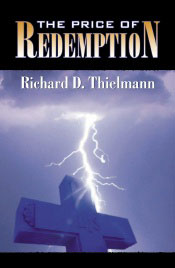Excerpt: The Price of Redemption

Del’s progress was monitored by Betty as she also kept track of the darkening sky. She clicked on the television with the remote, muted the soap opera, then selected the channel with the weather. An angry red crawl streamed across the bottom of the screen.
...SEVERE WEATHER ADVISORY FOR COUNTIES IN NW OHIO & SE MICHIGAN AS A STORM FRONT TRACKS NE AT 25 MILES PER HOUR...STRONG WINDS, ACCOMPANIED BY HEAVY RAIN AND OCCASIONAL HAIL CAN BE EXPECTED...WIND GUSTS CAN BE UP TO 60 MILES PER HOUR...FLOOD WARNINGS HAVE ALSO BEEN ISSUED FOR...
Betty went to the porch with her two-way radio and called Del.
“Hey, space commander, weather warning is big time on the TV. Take cover, Del, its coming fast. Look at that sky. Come on in here.”
“Not yet,” he squawked in return, “want to get some more done while I can. I’ll be okay.”
The storm came faster than Del had figured, based on what he had seen of the forming clouds. The onset didn’t match up with his judgment of how much time he had before it hit. He was running west and slowed the rig to get a better look. The clouds were piled as clumps of clay, colored in dark grays with shadows of blue-black and purple. Jagged streaks of lightening pierced the piles randomly every few seconds. He counted. There was no sound. Too far away yet, but coming fast. Betty was right, not much time.
He resumed his march across the earth, now at higher speed, determined to make the spreader cover more ground by moving faster, working the rows from north to south. Periodically there was a quick glance, a fleeting look at the billowing dark sky, but all in all he did not want to look at the oncoming storm. There was this overriding compulsion to keep at it no matter what, a focused, almost demented obsession that would have the rig keep on running.
Then, turning a row and looking full bore at what was nearly upon him, concern pulled at him for the first time. This might be bad. Perhaps he had been wrong-headed about this, perhaps he should have listened to Betty, heeded Roger Steinberg’s warning, believed what the television weather warning screamed at him. Perhaps it had been a mistake not to wait and this was an admission Del did not want to make. He had little time to consider it very much. The distinctive staccato of the engine reverberated over the wind that whipped around him. It was a sound of his work that usually gave him some satisfaction, but now was little consolation for his situation.
Overhead the gray sky had been replaced by a steely black cover. The sweet smell of rain overtook him and jogged his memory to other times, other storms when he had been caught out in the open, and swept with torrents of water drops blowing in at an angle almost like bullets. His rig had only a sun canopy, not an enclosed cab. He knew he would be soaked to the skin before he could get off the field and under shelter of the equipment shed. This was part of being a farmer, he consoled himself, of being part of the land, of nature, the role of the provider. He never thought about being hit by lightening.
The first drops of rain were big blobs of water that smacked randomly on the canopy, the tractor, the ground. Then came full blown sheets of water. Del was soaked to the skin in a matter of minutes and he knew darn well he should have headed for cover sooner. Lightening shot across the sky in a blinding slash of hot light. He counted. One, two, three, four...bang, five. Less than a mile away he calculated. He stepped the throttle a notch higher, pushing to get the rig off the field and into the shed as fast as possible.
The jagged brilliance of white he saw in front of him came from two distinct bolts stabbing the sky at once. One...two...bang came the noise of violent nature. Too close he thought, too close. A hundred yards from the edge of the field he stopped the rig, got off, and crawled underneath for cover. This action, motivated by respect for lightening, knowledge of its power, and fear for the consequences would save Del’s life. He was face down in muddy earth that was running with water. He covered his head with his arms. The wind blew his Detroit Tigers ball cap away before he could hold it, so that it skipped down the row and across the field. It would never be found.
Lightning struck the top of the tractor with a noise and violence that he could never have imagined and that he had never experienced, even in Viet Nam. There was an intense brilliance from the power of the strike, the ground around him glowed from the energy that bounced off the rig. Every electrical wire on the tractor melted, the bulbs blew in the running lights, and the plastic steering wheel sagged misshapen around its steel core. The battery exploded in all directions, sending lead and hot acid flying. Others would remark in time to come that it was a miracle the gas tank did not let go. The tractor engine was, of course, now still, the big rig stopped in its tracks like a bison shot dead, still forming a massive silhouette against the darkened sky, no longer able to move.
The rain continued to pelt the tractor and the wind blew chunks of hail that fiercely clanged against the steel fenders and engine housing. Del was there under the tractor, face down in the sloppy mud. He was alive, but unconscious.
I have received a First Place Award for fiction from Reader Views for my novel, The Price of Redemption.